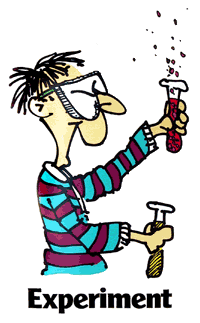Writer's Block—Tips From The Crew (Part 1)
Writer's block can be devastating to a writer. It can halt you in your tracks, and you end up sitting there feeling helpless. Here's some good news, though. Every writer goes through it, and many of them have figured out ways to combat the evil demon. Your job as a struggling writer is to try various things until you find something that works for you, which sums up the first of six tips presented below.

Trying out different styles and mixing genres together will not only give you a weapon against writer's block, but it can also help make your writing unique. It is also fun and gives you the chance to include unusual ideas formed from "thinking outside the box." There are no guarantees that it will work the first time or that everyone will like it, but there are also no reasons why you shouldn't give it a go.
I personally find dialog to be fairly easy to write most of the time, so oftentimes I will start writing a scene with just a few bits of dialog in mind. The description necessary to complete a scene is easier for me with a conversation already in place. Others might find dialog more difficult, so they might start with description instead.

Often writer's block comes about because the author thinks that they are not writing eloquently enough. The idea for the story is there, but somehow the wording looks wrong. And so they sit there, staring at a blank screen and waiting for the right words to come. The way to beat this is not to worry about the wording at all. Take it easy and just write whatever comes to mind, even if you'd laugh later at the horrible phrasing of the story. Just write without a care in the world. Write as fast as you can. At least now you've beaten the block and have the rough storyline. Worry about the word choices later. That's what editing's for, right?
If you're struggling to describe something, then relax, take a deep breath and look around you. Think of how you would describe your surroundings. Then think about your actions and how you would describe them. For example, instead of saying, "I put the pen down on the table," think of all the different ways you can say it. "I placed the pen carefully on the table" or "I threw the pen on the table in a careless manner." I find that the smallest, most insignificant things in a room—or the tiniest action—are often the most fun to try. Even if you don't have a block, it's a great warm up to get you in the mood for description.
This tip is more about preventing writer's block rather than treating it.
Writers are often told to get to know their characters very well before writing. But, this can be overdone. People are multifaceted, and so your characters should be, too. How your character acts should conform with the situation. Prepackaging characters can present a problem if what you wrote about them before doesn't match up to what you write later. That could give you a block.

The Masquerade Crew is very big into writing stories together; therefore, a tip on collaborating with fellow writers is in order.
It often helps to be involved in a lot of works in order to prevent writer's block from striking you. If you're able to switch from one story to another, it helps to rid the boredom that usually takes over when the plague hits or to avoid the sudden lack of creativity. If you're kept busy, writing in different stories that might have completely different plots/storylines, the ideas will flow to you naturally and help keep writer's block away.

1) Experiment
Trying out different styles and mixing genres together will not only give you a weapon against writer's block, but it can also help make your writing unique. It is also fun and gives you the chance to include unusual ideas formed from "thinking outside the box." There are no guarantees that it will work the first time or that everyone will like it, but there are also no reasons why you shouldn't give it a go.
2) Start with the Easiest
I personally find dialog to be fairly easy to write most of the time, so oftentimes I will start writing a scene with just a few bits of dialog in mind. The description necessary to complete a scene is easier for me with a conversation already in place. Others might find dialog more difficult, so they might start with description instead.

3) Don't Be Too Hard On Yourself
Often writer's block comes about because the author thinks that they are not writing eloquently enough. The idea for the story is there, but somehow the wording looks wrong. And so they sit there, staring at a blank screen and waiting for the right words to come. The way to beat this is not to worry about the wording at all. Take it easy and just write whatever comes to mind, even if you'd laugh later at the horrible phrasing of the story. Just write without a care in the world. Write as fast as you can. At least now you've beaten the block and have the rough storyline. Worry about the word choices later. That's what editing's for, right?
4) Imagine Everything is a Story
If you're struggling to describe something, then relax, take a deep breath and look around you. Think of how you would describe your surroundings. Then think about your actions and how you would describe them. For example, instead of saying, "I put the pen down on the table," think of all the different ways you can say it. "I placed the pen carefully on the table" or "I threw the pen on the table in a careless manner." I find that the smallest, most insignificant things in a room—or the tiniest action—are often the most fun to try. Even if you don't have a block, it's a great warm up to get you in the mood for description.
5) Don't Overdevelop Characters
This tip is more about preventing writer's block rather than treating it.
Writers are often told to get to know their characters very well before writing. But, this can be overdone. People are multifaceted, and so your characters should be, too. How your character acts should conform with the situation. Prepackaging characters can present a problem if what you wrote about them before doesn't match up to what you write later. That could give you a block.

6) Collaborations Galore!
The Masquerade Crew is very big into writing stories together; therefore, a tip on collaborating with fellow writers is in order.
It often helps to be involved in a lot of works in order to prevent writer's block from striking you. If you're able to switch from one story to another, it helps to rid the boredom that usually takes over when the plague hits or to avoid the sudden lack of creativity. If you're kept busy, writing in different stories that might have completely different plots/storylines, the ideas will flow to you naturally and help keep writer's block away.